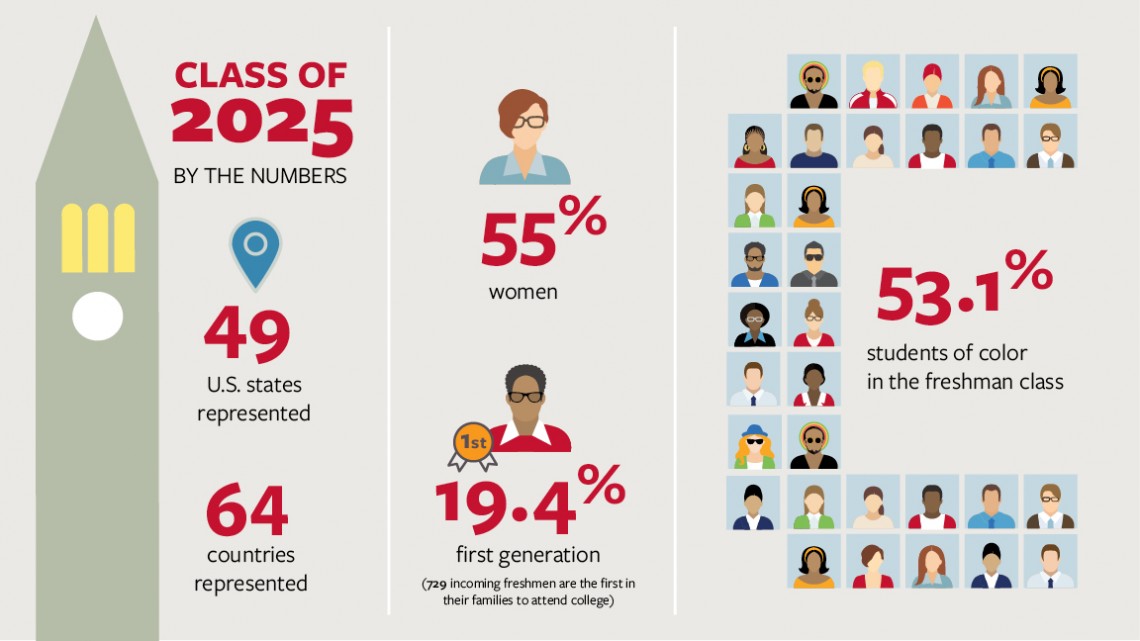
Pandemic-shaped Class of ’25 arrives at Cornell
By Tom Fleischman
In many ways, the Class of 2025 is unlike any previous group of incoming Cornell students – larger, more diverse and shaped unmistakably by the COVID-19 pandemic.
The record 3,750 first-year students who begin arriving in Ithaca on Aug. 19 is in part the result of planned growth and new campus housing. Students who are the first in their families to attend college account for almost all of that 13% increase, a testament to Cornell’s commitment to expanding access and opportunity.
The Class of 2025 was selected from a record 67,380 applications, an increase of nearly 16,000 from the previous year. Applicant excitement during a time of restricted travel grew thanks to robust virtual engagement opportunities and Cornell making it optional to report standardized test scores.
Jonathan Burdick, vice provost for enrollment, marveled at the resilient spirit of the new students arriving at Cornell this week.
“These are students who experienced a year and a half of disrupted high school,” Burdick said. “We will continue to meet them halfway, in terms of things that they were less likely to have encountered, because they were either at home for school or in a hybrid environment, and their access to normal high school life was severely constrained, for almost half of their high school years.”
He noted that the spring of their junior years – long seen as an important moment when students’ activities and achievements significantly impact college planning and aspirations – was turned upside down by the pandemic.
“We’re going to have to be more understanding and supportive of this group of students,” he said. “Their circumstances are just not the same as the class that entered last year, much less two years ago. They’re well-prepared and accomplished overall and individually, but no doubt the pandemic conditions challenged them and their preparation in unpredictable ways.”
Among the incoming students is an award-winning pianist who won her first international competition at age 9; a member of Japan’s under-19 national cricket team; and a student who founded a food insecurity platform that paid off student lunch debt at 21 public schools.
Burdick said he’s been asked repeatedly why he thinks that, in the middle of a global pandemic, the university’s admissions process was such a success.
“There are three things that are true,” he said. “First, Shawn Felton, executive director of undergraduate admissions, and his staff, and the college admissions teams, were well-prepared to pivot to virtual outreach and recruiting. That’s been going on now for 17 months and has been unusually successful. Also, there was Cornell’s success in managing the pandemic, and the good press that followed. And we removed a significant barrier for many considering applying to Cornell by eliminating the requirement for ACT and SAT scores for this past cycle and the upcoming admissions cycle as well.”
Other notable incoming students:
- the founder of a nonprofit web design firm to help small businesses and startups during the pandemic;
- a student who founded a nonprofit focused on serving neuro-atypical children, especially those on the autism spectrum;
- a student who developed algorithms used to detect user proximity to COVID-19-positive individuals;
- and several who’ve received patents, designed and created PPE during the pandemic and conducted STEM-related research.
Members of the new class hail from every U.S. state but Wyoming and 64 countries, and are 55% women and 53.1% communities of color. And 19.4% are first-generation college students – notable among the extraordinary diversity of this class.
Nearly half of the incoming class (49.3%) will be receiving need-based financial aid, with the average need-based grant award from university sources totaling more than $49,000, about 9% higher than last year.
A total of 674 transfer students – from a pool of more than 5,900 applicants, 929 of whom were admitted – will arrive at Cornell this fall, as well.
As noted in a message to students Aug. 12, all undergraduate, graduate and professional students are required to be vaccinated and to submit proof of vaccination (or request medical or religious exemption) by Aug. 16. Cornell Health will host on-campus vaccination clinics Aug. 19, 20, 21 and 25.
Media Contact
Get Cornell news delivered right to your inbox.
Subscribe
